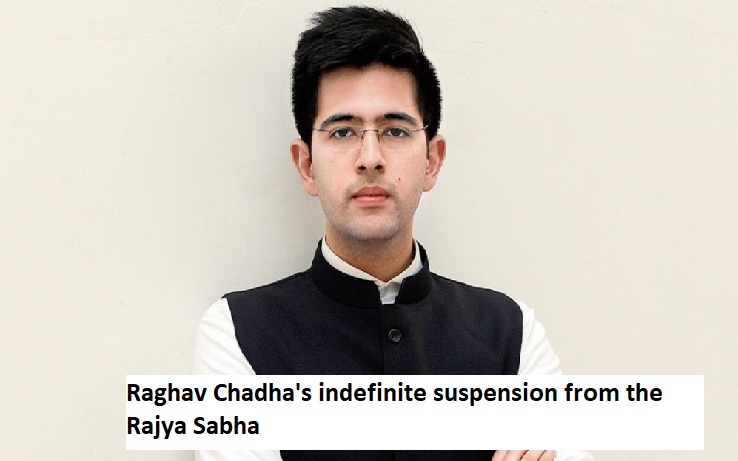


During the hearing of AAP leader Raghav Chadha's writ petition challenging his August 11 suspension from the Rajya Sabha, the Supreme Court expressed deep concern about indefinite MP suspensions and their impact on people's right to representation.
A panel consisting of CJI DY Chandrachud, Justice JB Pardiwala, and Justice Manoj Misra observed that the principle of proportionality should be considered, emphasizing the significance of preserving the opposition party's representation in Parliament. CJI noted, "We must exercise caution in excluding such voices from the Parliament."
Chadha's suspension stemmed from the accusation that he failed to confirm the consent of specific members he nominated for the select committee on the GNCTD (Amendment) Bill 2023. The Rajya Sabha Chairperson suspended Chadha while the Privileges Committee conducted an inquiry, in accordance with a resolution passed by the house.
During the hearing, the bench inquired whether Chadha's actions constituted a breach of Parliamentary privilege. CJI Chandrachud noted that according to house rules, obtaining members' consent is a prerequisite when appointing them to a select committee. Highlighting that the sole accusation against Chadha was his failure to confirm members' willingness before nominating them for the select committee, CJI questioned whether this warranted an indefinite suspension. He also mentioned that a member causing disruption is typically suspended for the remainder of the session, not indefinitely.
CJI Chandrachud questioned, "Is this worse than the disruption of proceedings? Is this really on a higher level? A person who disrupts the house is excluded for the rest of the session. In this case, the alleged infraction is that he didn't verify. Some proportionality is now an invented part of our jurisprudence," while addressing Attorney General for India R Venkataramani.
CJI also highlighted that Rules 256 and 266 of the Rules of Procedure and Conduct of Business in the Council of States were not applicable in this situation. He questioned whether inherent powers could be invoked to impose an indefinite suspension on a member.
"He did not ascertain the willingness... That's the only charge against him. He was suspended. Indefinitely. Rules 256 and 266 ex facie have no application. We should also apply the principle of proportionality," CJI stated. He further inquired if the absence of a specified time limit for the Privileges Committee to conclude its inquiry meant that Chadha would remain suspended indefinitely.
Senior Advocate Rakesh Dwivedi, representing Chadha, noted that the AAP legislator had already apologized for his actions and was willing to provide a written apology to the Chairperson. He also emphasized the importance of regulating and channeling the privileges of Parliament to prevent their misuse.
"I want to make it clear that I hold the Rajya Sabha in high regard. I have previously offered an apology, and I'm ready to provide a written apology to the Chairperson. However, the current process is clearly illegal and in violation of the law and constitution. It infringes upon fundamental rights and established conventions, with potentially dangerous consequences. It's high time we resolve the longstanding debate about whether privileges should be regulated by guidelines. Just as the Supreme Court's power of contempt is channeled, there should be a similar approach to Parliament's powers of privileges," Dwivedi stated
Dwivedi also highlighted that in the past, there have been around 11 similar occurrences in the Rajya Sabha, where members raised objections to their names being included in select committees proposed by their peers. In those instances, when a member declined consent, they were merely removed from the committee, and no punitive measures were taken against the member who made the recommendation. Additionally, he cited the Supreme Court's decision in the case of Ashish Shelar v. Maharashtra Legislative Assembly, where the Court invalidated the indefinite suspension of MLAs.
When Dwivedi mentioned Chadha's readiness to apologize, the CJI asked the AG whether the Rajya Sabha Chairman had the power to revoke the suspension upon accepting the apology, thus potentially preventing the Supreme Court from setting a legal precedent. However, the AG pointed out that the suspension was a result of a resolution passed by the House, and the Chairperson's actions were in compliance with that resolution.
The bench eventually postponed the hearing to Friday, November 3, and instructed both parties to submit a compilation of their arguments by Thursday.
TAGS: bench adjourned hearing Friday November 3 both sides file compilation submissions Thursday.